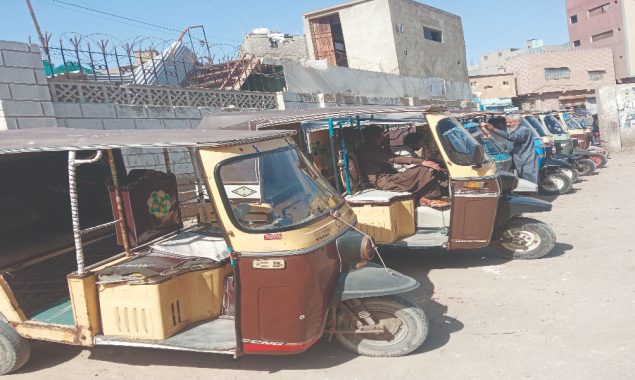
KARACHI: The traditional rickshaw drivers are losing their businesses, as more and more people are moving towards relatively cheaper online motorbike services for transportation.
The introduction of ride-hailing apps such as Bykea, Careem and Uber have dented the daily income of the local rickshaw drivers, while the rise in the fuel prices, shortage of compressed natural gas (CNG) and liquefied petroleum gas (LPG) are making it difficult for them to continue their business.
Bykea, the mostly used ride-hailing service, has witnessed massive expansion for being easy, efficient and cheap, compared with rickshaws, buses and cabs.
In a bid to curb pollution and discourage the use of LPG rickshaws, the government introduced CNG rickshaws, but owing to severe gas crisis the CNG filling stations were deprived of regular supplies, creating problems for the commuters.
A rickshaw driver Ikram said that the people now see rickshaw ride a luxury and prefer using Bykea.
“I used to take home Rs1,000 to Rs1,500 daily after working for around 8 to 10 hours, but now the situation has changed, as filling gas in my rickshaw took almost two to three hours,” he said.
“The introduction of Bykea is further making it harder for the rickshaw drivers to stay in the business, as people now use bike rides to go to places they want to, and that too at lower costs. The two types of rickshaws, which use LPG or CNG, costing around Rs200/kg, are no match for a bike running on patrol, which is around Rs145/litre.”
“We have to ask for more fare, as we have to keep our fuel usage and maintenance of the vehicle in mind, and as a result, the customers opt for bike rides rather than paying around double the fare for a rickshaw ride,” he added.
Sultan Karim, another rickshaw driver, said: “Our daily income has now come down to Rs600 to Rs800 after paying the fuel bill, compared with Rs1,000 to Rs1,200 a few years ago.”
“Many drivers are now planning to shift to other options, but that too is difficult, as we don’t have that amount of saving to start a business,” he added.
“Many customers after hearing our fares, refuse to use rickshaw,” Karim added.
Sabir, a rickshaw manufacturer, said: “The rickshaw sales has declined around 30 per cent to 35 per cent in the last couple of years, as the people do not consider them an affordable source of transportation.”
“The introduction of Bykea has played its part in affecting the sales along with the increasing price of imported rickshaws, which a driver cannot afford, but the major reason for the declining sales of rickshaws remains the less income of passengers, which after inflation cannot afford rickshaw ride for daily use,” he added.
The people from middle and lower classes now frequently use Bykea rides, as it is easy to book, and costs lower than a Careem, Uber, CNG or LPG rickshaw.
“Mostly men use Bykea rides as women in our society do not feel it comfortable to sit with a stranger on a bike. This bike riding service is popular because people don’t have to stand at stops,” Rehan, a Bykea rider said.
“Nowadays, it has become the best investment opportunity because it does not need huge amounts,” he added.
Talking about the daily income, he said: “It depends on the availability to accept bookings and being there on time. On a normal day, my earnings could reach around Rs1,200 to Rs1,500, but the recent hike in the petroleum products prices our fuel bill is increasing,” Rehan added.
Read More News On
Catch all the Business News, Breaking News Event and Latest News Updates on The BOL News
Download The BOL News App to get the Daily News Update & Follow us on Google News.




